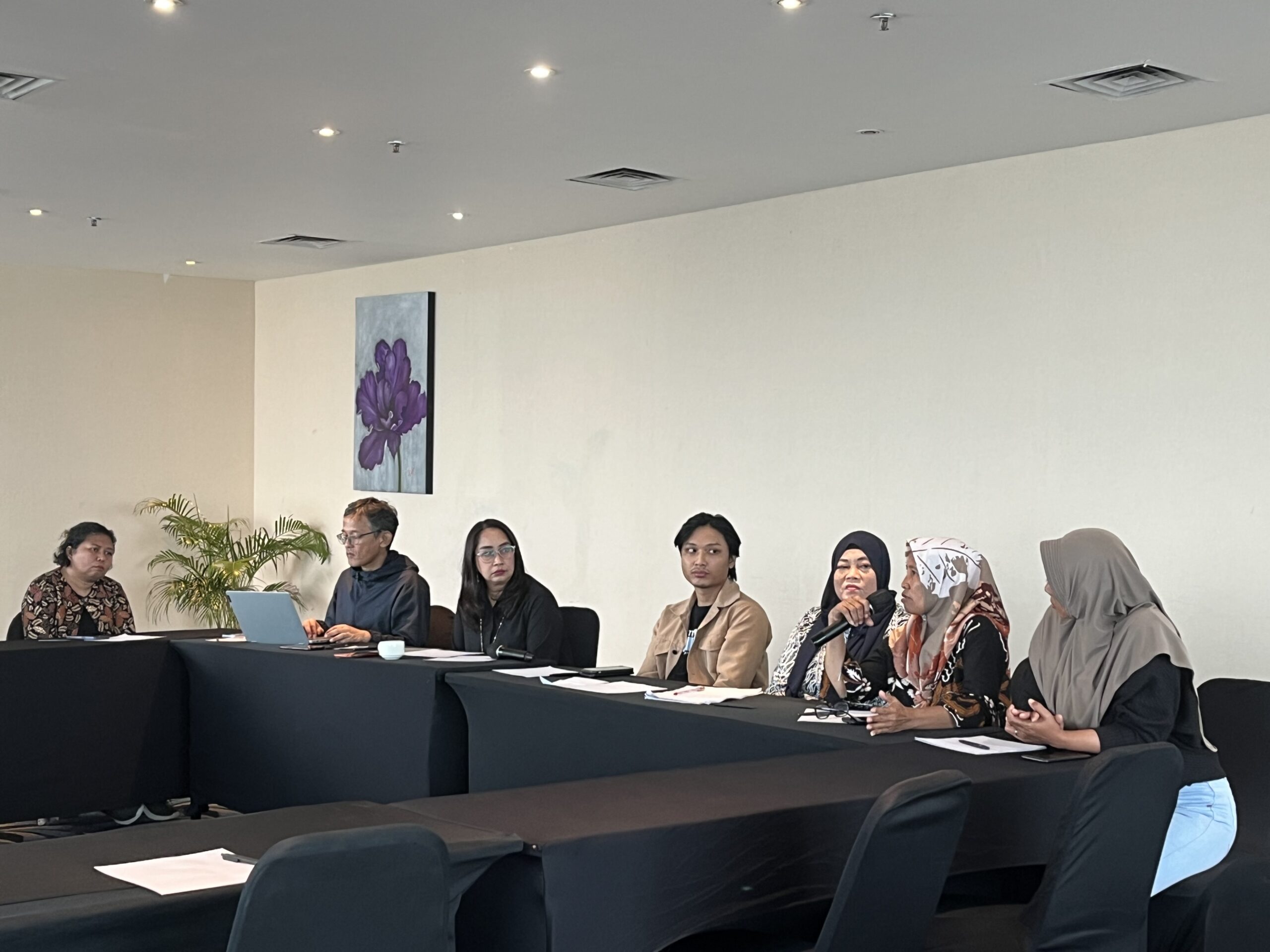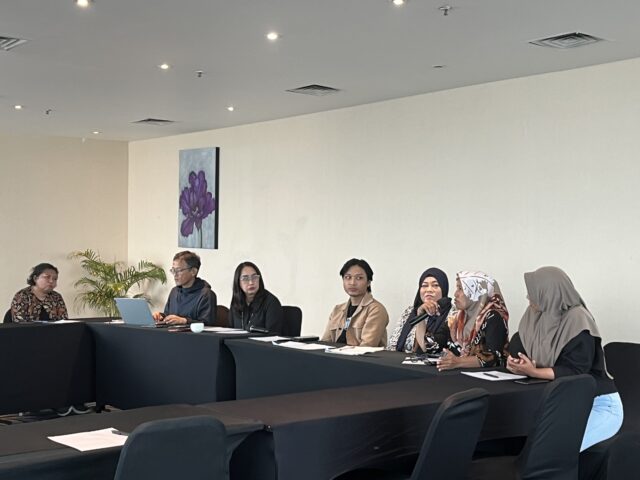
Climate Justice | July 19, 2024
Indonesia’s Commitments in Climate Agreement Documents: Are they Inclusive?
Authors: Nisrina Nadhifah Rahman dan Ruhaina Zulfiani
What is Nationally Determined Contribution (NDC) and Second NDC?
Since 2015, Indonesia has demonstrated its commitment at the global level in addressing climate crisis by preparing and submitting to the United Nations Framework Convention on Climate Change (UNFCCC) Intended Nationally Determined Contribution (INDC) in 2015, First Nationally Determined Contribution or First NDC in 2016, Updated NDC in 2021, and Enhanced NDC (ENDC) in 2022.
The latest development is that the Government of Indonesia, led by the Ministry of Environment and Forestry (MoEF), plans to submit the Second Nationally Determined Contribution (Second NDC or SNDC) in August 2024, which is earlier than the agreement stated in the Paris Agreement in 2025.[1]
Upon further analysis, many critical elements remain absent in these climate commitment documents, particularly the integration of justice lens and perspectives. This encompasses both justice based on the subjects, which focuses on the rights and needs of individuals and communities, and justice based on the landscapes.
The climate crisis, in fact, intensifies the hardships faced by the people, disproportionately impacting vulnerable groups. These include indigenous peoples, persons with disabilities, traditional fisherfolk and coastal communities, small farmers, women, labors, the urban poor, and young people.
Timeline of Civil Society Contributions to Second NDC
Various initiatives from civil society groups have been born to ‘assist’ the Government of Indonesia, in this case specifically the Ministry of Environment and Forestry (MoEF), to prepare a more comprehensive, concrete, and climate justice-oriented Second NDC submission.
Since April 2024, several civil society groups such as the PIKUL Foundation, Madani Berkelanjutan Foundation and Humanis have participated in series of discussions sessions aim to gather insights from peers engaged in the adaptation sector, collaboratively reviewing and evaluating the adaptation aspects of the Enhanced Nationally Determined Contributions (Enhanced NDC) document.
Through our analysis, we discovered that the Enhanced NDC was developed with minimal input from community groups, particularly those most affected by climate change. Additionally, the document lacks contextual relevance, failing to align with the geographical, economic, social, and cultural conditions of the regions it addresses. It is crucial to avoid these shortcomings in the preparation of the Second NDC to ensure a more inclusive and contextually appropriate approach.
In May 2024, around 23 civil society organizations working in Sumatera, Jawa, Kalimantan, Sulawesi, Bali, Nusa Tenggara Timur, Maluku and Papua, continued the rapid review process of Enhanced NDC[2], along with its appendices such as Roadmap NDC Climate Change Adaptation[3], and Indonesia’s Adaptation Communication.[4] The framework and lens used in conducting this rapid assessment of these documents are Adaptation Justice Index[5] consisted of Recognitive Justice, Procedural Justice, Distributive Justice, and Restorative Justice.
| DEFINITION BOX |
| · Recognition Justice: entails acknowledging that society comprises diverse groups with varying needs, desires, and levels of adaptability. It recognizes the structural vulnerabilities and inequalities experienced by different groups, particularly those facing specific challenges regarding civil, political, economic, and socio-cultural rights. Recognitive Justice emphasizes the importance of considering the unique circumstances and perspectives of all societal segments to ensure equitable treatment and opportunities.
· Procedural Justice: includes decision-making processes that are transparent, accountable, and considerate of diverse voices, values, and perspectives. To achieve procedural justice, community participation must be comprehensive, collaborative, equitable, and continuous.
· Distributive Justice: includes how the impacts of climate change and the effects (positive and negative) of adaptation actions are equitably distributed in society.
· Restorative Justice: includes recognizing and addressing the adaptation context related to loss and damage, with a priority on offsetting or replacing the harm caused by climate change impacts and maladaptation effects. Particular attention should be given to the groups most affected, including and especially vulnerable populations. |
The participation of the FOCUS Humanis team in the civil society forum in May 2024 emphasized the necessity of addressing the distinct contexts between urban and non-urban coastal communities. This differentiation is crucial due to their varying experiences and challenges. For instance, while urban coastal communities may not rely primarily on fishing for livelihoods, urban fisherfolk still confront the impacts of climate change, including the risks of tidal flooding, industrialization, developmental pressures, waste disposal issues, and other related challenges.
On the other hand, non-urban coastal communities contend with distinct challenges, including being disproportionately affected by developmental activities and the exploitation of their natural surroundings. They often experience limited access to support, facilities, compensation, and other resources.
It is equally crucial to prioritize the welfare of fisherfolk and coastal communities, which involves recognizing the roles of women fisherfolk, safeguarding the rights of fisher laborers, and addressing the unique needs and multiple challenges faced by fisherfolk with disabilities.
In June 2024, civil society coalition also sent a Open Letter to the Minister of Environment and Forestry (MoEF) of the Republic of Indonesia and launched a Press Release containing a few aspirations to realize climate justice for the people of Indonesia through a more participatory, inclusive and meaningful Second NDC drafting process.
Workshop on “Speaking Up for Climate: Realizing Climate Justice for the Marginalized”
On 3-4 July 2024, civil society coalition collaboratively held a workshop “Speaking Up for Climate: Realizing Climate Justice for the Marginalized” as well as a media briefing with representatives from vulnerable groups such as the urban poor, person with disabilities, young people, and women fisherfolk. This media briefing aims to amplify and advocate the aspirations of vulnerable groups, ensuring their voices resonate widely through various media channels.
Ade from Perhimpunan Jiwa Sehat highlighted the significant challenges faced by person with disabilities in finding employment, particularly in the informal sector such as street vendors. The climate crisis has heightened the vulnerability of their livelihoods, often leading to job losses due to increasingly extreme weather conditions. Furthermore, the country’s infrastructure remains biased against people with disabilities (ableism), particularly concerning the accessibility of public facilities. During climate disasters, individuals with disabilities are frequently evacuated last due to challenges in access and inadequate evacuation equipment.
Other concerns were also expressed by Wati from the Urban Poor People’s Network (JRMK). Various strategic projects in coastal urban areas are often built without fully inclusive participatory consultation with the community. The construction of dams, walls, or giant sea walls to overcome tidal flooding is only delaying the real problem.
Women fisherfolk from Demak, Nur Rikhah and Hidayah, also faced specific challenges due to the climate crisis. Rising sea temperatures and unpredictable tidal waves have made it increasingly difficult for fishermen to make catches. Additionally, obtaining recognition as fisherfolk presents challenges for women. Without this recognition, women fisherfolk are at greater risk because they cannot access various forms of assistance and insurance.
Certainly, insurance plays a crucial role as the risks associated with going to sea are escalating due to the climate crisis. Moreover, the threat of tidal flooding is increasingly jeopardizing the living spaces of women fisherfolk in coastal Demak. Nur Rikhah and Hidayah also expressed concern over the insufficient involvement of fisherfolk in government policy-making and coastal development processes.

Photo 1. Nur Rikhah and Hidayah (first and second from right) women fisherfolk from Demak, Central Java during the Media Briefing on July 4th 2024 (Ruhaina Zulfiani)
The process of drafting climate-related policies that tokenize young people has resulted in policies that fail to address their specific interests and needs. Fathan from Climate Rangers Jakarta explained that young people are highly vulnerable and face the potential inheritance of damages and various adverse impacts from policies crafted by previous generations. Fathan also noted that access to education has been inequitable and that the education system has not sufficiently promoted critical thinking, particularly regarding climate change issues.
***
[1] NN. “Siapkan Second NDC, Indonesia Perkuat Komitmen Atasi Dampak Perubahan Iklim.” ppid@menlhk, 22 April 2024, https://ppid.menlhk.go.id/berita/siaran-pers/7684/siapkan-second-ndc-indonesia-perkuat-komitmen-atasi-dampak-perubahan-iklim. Accessed 21 May 2024
[2] https://unfccc.int/documents/615082?gad_source=1&gclid=Cj0KCQjwhb60BhClARIsABGGtw9RZyvfNCHDmTGyKxkr4pnxYD5waVdr9rkggOvjhpseRRnSdPk4qtkaAo0qEALw_wcB
[3] https://ploboks.id/doc_repository/29/Roadmap_NDC_API_opt.pdf
[4] https://unfccc.int/sites/default/files/ACR/2022-11/221119%20Indonesia%20Adaptation%20Communication.pdf
[5] https://helda.helsinki.fi/server/api/core/bitstreams/57a186ca-b436-421b-994c-d556ae8c3f1c/content

